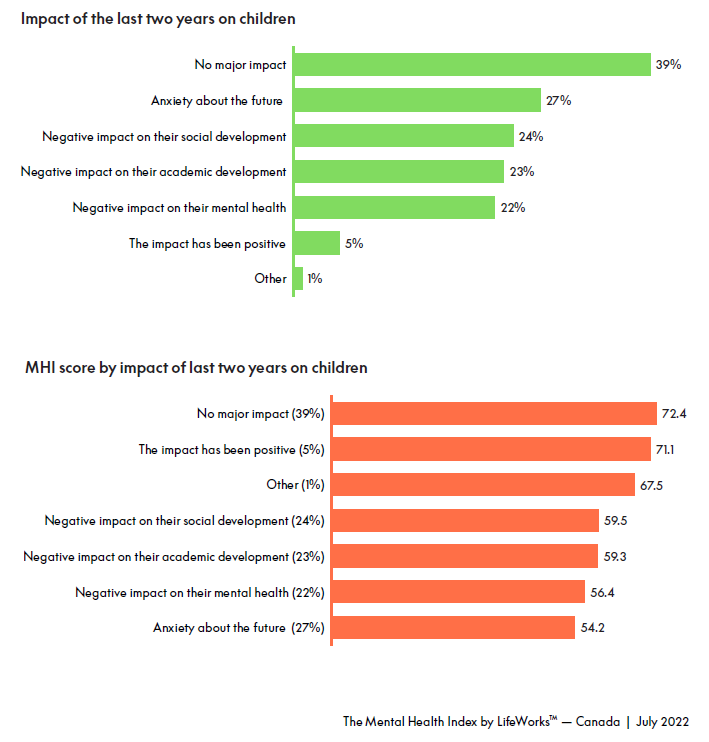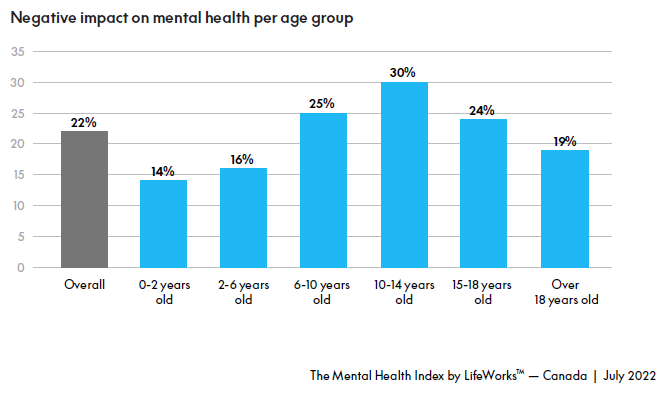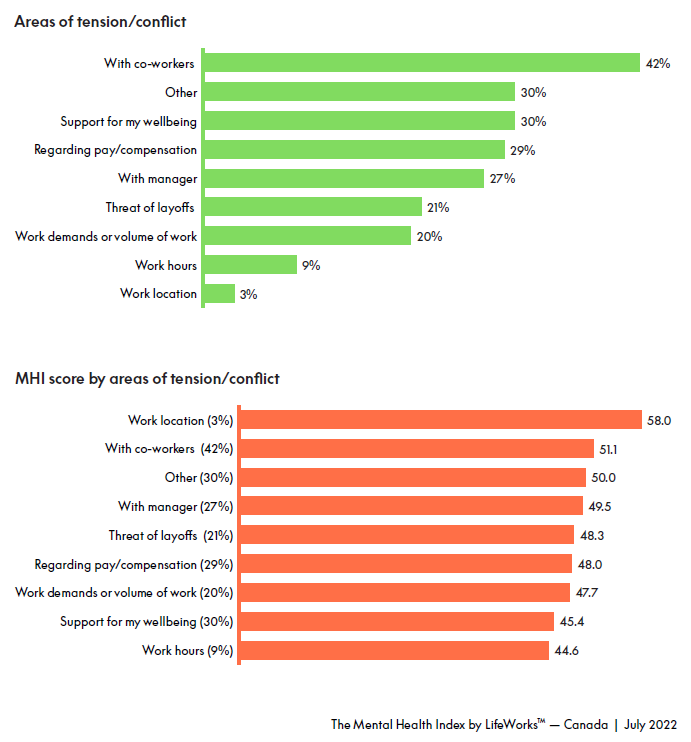How the last two years have impacted the mental health of Canadian children

The latest mental health index (MHI) was released by LifeWorks on Wednesday, analyzing the mental health of Canadians, with a focus of what has happened since the pandemic.
One major point from their survey for July found 56 per cent of Canadians with Children feel their children have been negatively impacted over the last two years.
Breaking down specific impacts, 27 per cent of respondents say there is anxiety about their children's future, 24 per cent say there has been a negative impact on their social development, while 23 per cent say the same about their academic development.
Another 22 per cent say their children's mental health has been negatively impacted, meanwhile, 39 per cent say there has been no impact on their children from the last two years.
LifeWorks noted those who said there was no impact also had the highest MHI score at 72.4 per cent, while those with anxiety about the future had the lowest scores at 54.2 per cent.
 Source: LifeWorks
Source: LifeWorks
Breaking down these numbers further, LifeWorks found that 29 per cent of kids between the ages of 15 and 18 have anxiety about the future, while 31 per cent of those over 18 are in the same boat.
Kids between the ages of 10 and 14 had the highest negative impact on their mental health at 30 per cent, while the negative impact on social development was equal for all ages from two to 18.
 Source: LifeWorks
Source: LifeWorks
The survey also found that there is an equal concern for academic development for kids between the ages of six and 18.
On the more positive side, for those who said there was no impact or a positive impact over the last two years, 53 per cent are for those over 18 and 49 per cent are those from zero to two.
WORKPLACE AND MENTAL HEALTH
During this survey, LifeWorks also looked at some workplace-related categories and how it impacts Canadians mental health.
One of the questions asked was if people had been experiencing any tension or conflicts at work.
While 59 per cent said they are not dealing with conflicts, 25 per cent said they are. Depending on how people answered the question, it greatly impacted their MHI scores. Those experiencing conflict had a score of 51.8 while those not had scores of 72.9.
The survey also found managers were 50 per cent more likely to have conflict or tension and those under 40 were 80 per cent more likely than people over 50 to experience tension or conflict.
 Source: LifeWorks
Source: LifeWorks
The areas of tension or conflict were also broken down during the survey, with 42 per cent saying the conflict was with other co-workers.
Other reasons and support for wellbeing were tied at 30 per cent each followed closely by pay and compensation at 29 per cent and manager conflicts at 27 per cent. Only three per cent had tension or conflict regarding their work location, they also had the highest MHI score at 58, followed by conflict with co-workers at 51.1.
Canadians were also asked if they trust the organization they work for to act ethically. The survey found 71 per cent felt their company would, while nine per cent disagreed.
The 71 per cent had the highest MHI score at 68.6.
A majority of those surveyed also thought senior leadership would consider the wellbeing of employees in decision making at 63 per cent, while 16 per cent did not think that was the case.
Those who agreed had an MHI score of 69.2 compared to 55.5 for those who disagreed.
It was also determined that 66 per cent of respondents believe their manager would act in the best interest of the people they manage.
Employees were also found more likely to trust their colleagues to support them with 68 per cent agreeing with that statement, compared to 10 per cent against. The MHI score reflected the attitudes with a score of 69.3 for those who agreed and 51.3 for those who disagreed.
The overall mental health index for Canadians climbed slightly in July 2022, compared to June, going from 64.1 to 65.0.
Manitoba's index is just below the national average at 64.2, and it is also higher than the previous month at 63.4.
LifeWorks surveyed 3,000 Canadians online between July 7 and 13, who are employed or were employed over the last six months.
The organization said people "are selected to be representative of the age, gender, industry, and geographic distribution in Canada. Respondents are asked to consider the prior two weeks when answering."
MHI scores fall into three categories; those from zero to 49 are considered distressed, 50 to 79 are considered strained and 80 to 100 are considered optimal.
CTVNews.ca Top Stories

Azerbaijani airliner crashes in Kazakhstan, killing 38 with 29 survivors, officials say
An Azerbaijani airliner with 67 people onboard crashed Wednesday near the Kazakhstani city of Aktau, killing 38 people and leaving 29 survivors, a Kazakh official said.
Richard Perry, record producer behind 'You're So Vain' and other hits, dies at 82
Richard Perry, a hitmaking record producer with a flair for both standards and contemporary sounds whose many successes included Carly Simon’s 'You’re So Vain,' Rod Stewart’s 'The Great American Songbook' series and a Ringo Starr album featuring all four Beatles, died Tuesday. He was 82.
Hong Kong police issue arrest warrants and bounties for six activists including two Canadians
Hong Kong police on Tuesday announced a fresh round of arrest warrants for six activists based overseas, with bounties set at $1 million Hong Kong dollars for information leading to their arrests.
Read Trudeau's Christmas message
Prime Minister Justin Trudeau issued his Christmas message on Tuesday. Here is his message in full.
Stunning photos show lava erupting from Hawaii's Kilauea volcano
One of the world's most active volcanoes spewed lava into the air for a second straight day on Tuesday.
Indigenous family faced discrimination in North Bay, Ont., when they were kicked off transit bus
Ontario's Human Rights Tribunal has awarded members of an Indigenous family in North Bay $15,000 each after it ruled they were victims of discrimination.
What is flagpoling? A new ban on the practice is starting to take effect
Immigration measures announced as part of Canada's border response to president-elect Donald Trump's 25 per cent tariff threat are starting to be implemented, beginning with a ban on what's known as 'flagpoling.'
Dismiss Trump taunts, expert says after 'churlish' social media posts about Canada
U.S. president-elect Donald Trump and those in his corner continue to send out strong messages about Canada.
Heavy travel day starts with brief grounding of all American Airlines flights
American Airlines briefly grounded flights nationwide Tuesday because of a technical problem just as the Christmas travel season kicked into overdrive and winter weather threatened more potential problems for those planning to fly or drive.


































